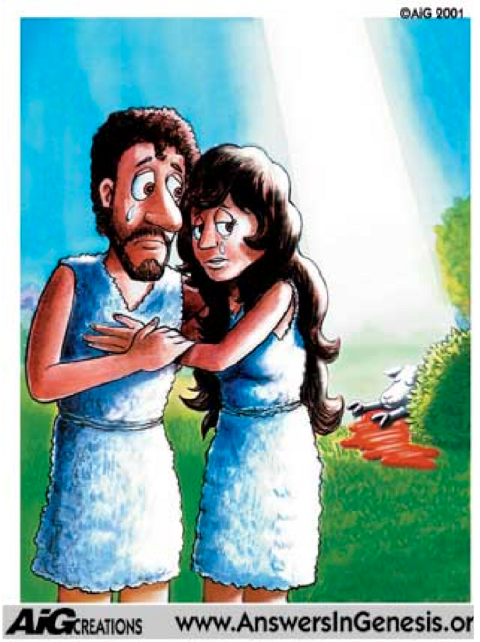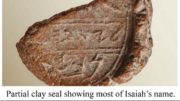Was there death before sin? To answer this question let’s consider how this concept is given, who gave it, the character of the one who gave it, what life is, and the reasons for opposition to accepting it’s reality. A command was given on Day Six of the creation week by God to Adam the first man. Eve had not yet been made from Adam’s rib so she did not hear the words God spoke to Adam but was probably, in turn, taught by Adam what God had told him. Originally, the universe was a perfect creation; the Creator Himself said it was very good. In that perfect creation God planted a special garden for his perfect creation, man. Adam was perfect, he had no deterioration of his genetic code, he was strong, his brain worked perfectly, he was a perfect human being. So the background to the entrance to death and sin into our universe is perfection.
God gave Adam free reign of the garden and everything was food for him except one, the tree of the knowledge of good and evil.
And Jehovah God layeth a charge on the man, saying, “Of every tree of the garden eating thou dost eat; and of the tree of knowledge of good and evil, thou dost not eat of it, for in the day of thine eating of it, dying thou dost die.” (Genesis 2:16-17) 1
So the Creator told the created that he could eat anything he wanted but one thing. If he did so, he would start dying and eventually end up dead. It indicates the beginning of the physical dying process we all have observed around us. Why is it our great grandfathers aren’t here for Christmas? Obviously, they have probably experienced the death part of the dying cycle. From the minute we are born we are initiated into the dying cycle. The only way anyone here on earth can avoid it will be by miraculous means.
Since God told Adam that he could not eat the fruit, it would be an act of rebellion or disobedience for Adam to do so. God has authority over his creation, He owns everything, it is all His. He has the right to set any boundary He desires. He also knows how he made us and how we work, emotionally and spiritually. His commands are an expression of His holiness but also instruction in our protection and well-being. His commands protect us from harm!
For this is the love of God, that we keep His commandments; and His commandments are not burdensome. (I John 5:3)
His commands are there for our benefit, to protect us from the effects that sin causes.
God’s character is attacked almost universally but rarely understood. One character of God that is maligned the most is his love. Either it is perverted that he cannot punish anyone because he loves everyone so much or that He is an ogre that gets some fiendish delight from torturing and killing. Both extremes malign who He is. Below is a short list of God’s characteristics:2
The Omnipotence of God: This means that God is all-powerful, and all-mighty. He controls all the power in all the created things and all power that exists in any dimension, place or time.
And I heard as it were the voice of a great multitude, and as the voice of many waters, and as the voice of mighty thunderings, saying, Alleluia: for the Lord God omnipotent reigneth. (Revelation 19:6)
The Omniscience of God: This describes the fact that God is “All-Knowing.” God knows everything, how many atoms are in the universe, the names of all His angels, and everything about everyone who has ever existed or that will ever exist.
For if our heart condemn us, God is greater than our heart, and knoweth all things. (I John 3:20)
The Omni-sapience of God: By this we mean “All-Wisdom,” God has all wisdom.
O the depth of the riches both of the wisdom and knowledge of God! How unsearchable are his judgments, and his ways past finding out! (Romans 11:33)
The Omnipresence of God: “Omnipresent” simply means everywhere present.
“Can any hide himself in secret places that I shall not see him?” saith the LORD. “Do not I fill heaven and earth?” saith the LORD. (Jeremiah 23:24)
The Eternity of God: God is without beginning and without end.
I said, “O my God, take me not away in the midst of my days—thy years are throughout all generations. Of old hast thou laid the foundation of the earth, and the heavens are the work of thy hands. They shall perish, but thou shalt endure; yea, all of them shall wax old like a garment; as a vesture shalt thou change them, and they shall he changed. But thou art the same, and thy years shall have no end.” (Psalms 102:24-27)
The Immutability of God: This means that God is “Un-changing” or “Unchangeable.” He is consistent to what He is.
2 For a deeper discussion on the attributes of God see “Who Is This Creator?” TASC Website, Featured Articles, Sept 2009.
Jesus Christ the same yesterday, and today, and for ever. (Hebrews 13:8)
The Love of God:
He that loveth not knoweth not God; for God is love. (I John 4:8)
The Mercy of God: The Mercy of God is infinite and inexhaustible within His Divine nature which disposes God to be actively compassionate.
(For the LORD thy God is a merciful God;) he will not forsake thee, neither destroy thee, nor forget the covenant of thy fathers which he sware unto them. (Deuteronomy 4:31)
The Grace of God: The grace of God toward us is unmerited favor.
Not by works of righteousness which we have done, but according to his mercy he saved us, by the washing of regeneration, and renewing of the Holy Ghost, which he shed on us abundantly through Jesus Christ our Saviour; that being justified by his grace, we should be made heirs according to the hope of eternal life. (Titus 3:5-7)
The Faithfulness of God: The meaning of “Faithfulness” is to stay, lean, prop, support.
Know therefore that the LORD thy God, he is God, the faithful God, which keepeth covenant and mercy with them that love him and keep his commandments to a thousand generations; and repayeth them that hate him to their face, to destroy them: he will not be slack to him that hateth him, he will repay him to his face. (Deuteronomy 7:9-10)
The Holiness of God: The Holiness of God is so vast there is no created thing that can be compared to it.
Above it stood the seraphims: each one had six wings; with twain he covered his face, and with twain he covered his feet, and with twain he did fly. And one cried unto another, and said, Holy, holy, holy, is the LORD of hosts: the whole earth is full of his glory. (Isaiah 6:2-3)
The Purity of God: God is the only pure, uncontaminated being.
This then is the message which we have heard of him, and declare unto you, that God is light, and in him is no darkness at all. (I John 1:5)
The Righteousness of God: God is always right.
He is the Rock, his work is perfect: for all his ways are judgment: a God of truth and without iniquity, just and right is he. (Deuteronomy 32:4)
The Justice of God: Justice embodies the idea of moral equity, and inequity is the exact opposite.
The just LORD is in the midst thereof; he will not do iniquity: every morning doth he bring his judgment to light, he faileth not; but the unjust knoweth no shame. (Zephaniah 3:5)
The Truth of God: That which God has revealed in His Word is Eternal Truth, and God never contradicts Himself. GOD CANNOT TELL A LIE!
God is not a man, that he should lie; neither the son of man, that he should repent: hath he said, and shall he not do it? Or hath he spoken, and shall he not make it good? Behold, I have received commandment to bless: and he hath blessed; and I cannot reverse it. (Numbers 23:19-20)
Now it is obvious that God’s character is above reproach; He cannot tell a lie and is the perfect witness to testify to the truth. He stated that death would be the result of disobedience, eating from the tree that was forbidden, therefore, there could not have been any death before that time.
Now what does classify as life? In biology there is no such thing as a definition but only a list of characteristics. Living organisms have the following characteristics: they undergo metabolism, maintain homeostasis, and possess a capacity to grow, respond to stimuli, and reproduce. God did give life to certain animals as shown in the following verse.
And to every beast of the earth, and to every fowl of the air, and to every thing that creepeth upon the earth, wherein there is life, I have given every green herb for meat: and it was so. (Genesis 1:30)
He also gave a special breath of life to man.
And the LORD God formed man of the dust of the ground, and breathed into his nostrils the breath of life; and man became a living soul. (Genesis 2:7)
So it would seem only birds, higher animals, and man had life in the scriptural sense of beginning to die if Adam and Eve disobeyed God. Death and the curse effect the whole creation as we see in Romans 8:22:
For we know that the whole creation groaneth and travaileth in pain together until now.
What God says in Genesis about creation can never be harmonized with the philosophy of old ages, gaps, or evolution. All these ideas are not found in the Scriptures but are from non-scriptural and often times antiscriptural sources. If one studies science, not a scientist’s interpretation, and the scriptures, they would find they are not contrary to each other but present a harmonious picture of reality that can be observed with our five senses. We have the charge to:
Study to shew thyself approved unto God, a workman that needeth not to be ashamed, rightly dividing the word of truth. (II Timothy 2:15)
First take God at His word, knowing His character is perfect, that He would have the wisdom to present what we need to know in a way it can easily be understood in our fallen state. It takes faith to believe God and His word when the prince of this world does everything it can to destroy faith leading to salvation and growth in Christ. Jesus said the TRUTH will set you free, and the only dependable source for one who claims to belong to Christ is the Word of God.
SOURCE: TASC | TASC’s mission is to rebuild and strengthen the foundation of the Christian faith by increasing awareness of the scientific evidence supporting the literal Biblical account of creation and refuting evolution





